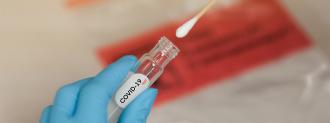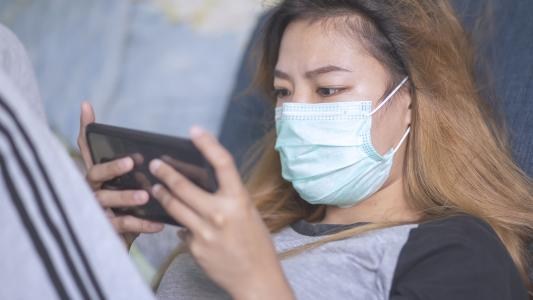Self-collected samples are just as effective for diagnosing COVID-19 as ones collected by medical staff, according to a new study led by UnitedHealth Group.
Not only could this knowledge help decrease healthcare workers’ risk of catching the disease, it also eliminates one major argument against at-home coronavirus tests, which are currently prohibited by the U.S. Food and Drug Administration (FDA).
The Case for At-Home Coronavirus Tests
The first step in the standard coronavirus diagnostics test is collecting a specimen sample.
To do that, a healthcare worker inserts a 6-inch long swab into a person’s nasal cavity.
Once the swab reaches the point where the throat begins (the nasopharynx), the worker rotates it for about 15 seconds. (This is not a very pleasant experience.)
Finally, they place the swab into a liquid-filled tube and send it to a lab for testing.
One argument against at-home coronavirus tests has been that patients won’t be able to effectively collect their own sample through these nasopharyngeal swabs — but this new study suggests they might not have to.
“(This) will radically change how the samples are obtained and make the healthcare worker much safer.”
Yuan-Po Tu
For the study, UnitedHealth Group and its partners asked nearly 500 patients in Washington state to self-collect samples for coronavirus testing.
Rather than using nasopharyngeal swabs, however, these patients used nasal swabs, which only need to reach the front and middle part of the nose.
Those swabs led to the accurate detection of the coronavirus in more than 90% of positive patients — a level of accuracy consistent with nasopharyngeal swabs administered by medical professionals.
Updated Guidelines for Coronavirus Testing
Following the release of the study results, the FDA updated its stance on COVID-19 sample collection, listing self-collection from the front or mid-part of the nose as an acceptable alternative to nasopharyngeal swabs.
One caveat: the patient has to be at a clinic or hospital when they do the collecting.
That’s because, while the new study does eliminate one argument against at-home coronavirus tests — that self-collected samples aren’t as effective — other arguments remain.
For one, at-home coronavirus tests require a patient to not only collect their own sample, but then ship it to a lab, and the time needed for that latter part of the process could affect the sample’s integrity, as cardiologist Edo Paz recently told CNET.
Another potential issue: contamination. The average home is far less sterile than most medical facilities, so people who use at-home coronavirus tests risk sending in contaminated samples that could produce faulty results.
Still, many others argue that the benefits of at-home coronavirus tests — the ability to test far more people without flooding health clinics — outweigh these objections against the tests.
The FDA itself has suggested it might change its stance on at-home coronavirus tests in the future, too.
“The FDA sees the public health value in expanding the availability of COVID-19 testing through safe and accurate tests that may include home collection, and we are actively working with test developers in this space,” it wrote in a March 20 statement.
Even if this study alone isn’t enough to change the FDA’s mind about at-home coronavirus tests, though, it’s poised to have a huge impact on the fight against the coronavirus.
Letting patients collect their own samples will free up trained staff to tackle other tasks, all while minimizing both their potential exposure to the coronavirus and the use of personal protective equipment, such as face masks and gloves.
“This is groundbreaking, because it will radically change how the samples are obtained and make the healthcare worker much safer,” lead researcher Yuan-Po Tu, the director of infectious diseases at UnitedHealth’s Everett Clinic, told the Wall Street Journal.






